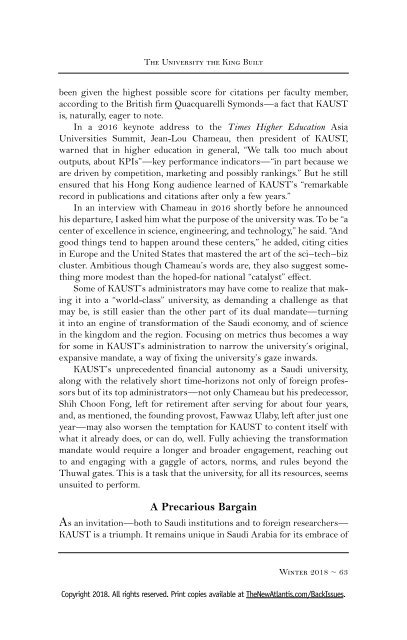The New Atlantis - Winter 2018 (Issue 54) uncompressed with cover
Create successful ePaper yourself
Turn your PDF publications into a flip-book with our unique Google optimized e-Paper software.
<strong>The</strong> University the King Built<br />
been given the highest possible score for citations per faculty member,<br />
according to the British firm Quacquarelli Symonds — a fact that KAUST<br />
is, naturally, eager to note.<br />
In a 2016 keynote address to the Times Higher Education Asia<br />
Universities Summit, Jean-Lou Chameau, then president of KAUST,<br />
warned that in higher education in general, “We talk too much about<br />
outputs, about KPIs” — key performance indicators — “in part because we<br />
are driven by competition, marketing and possibly rankings.” But he still<br />
ensured that his Hong Kong audience learned of KAUST’s “remarkable<br />
record in publications and citations after only a few years.”<br />
In an interview <strong>with</strong> Chameau in 2016 shortly before he announced<br />
his departure, I asked him what the purpose of the university was. To be “a<br />
center of excellence in science, engineering, and technology,” he said. “And<br />
good things tend to happen around these centers,” he added, citing cities<br />
in Europe and the United States that mastered the art of the sci – tech – biz<br />
cluster. Ambitious though Chameau’s words are, they also suggest something<br />
more modest than the hoped-for national “catalyst” effect.<br />
Some of KAUST’s administrators may have come to realize that making<br />
it into a “world-class” university, as demanding a challenge as that<br />
may be, is still easier than the other part of its dual mandate — turning<br />
it into an engine of transformation of the Saudi economy, and of science<br />
in the kingdom and the region. Focusing on metrics thus becomes a way<br />
for some in KAUST’s administration to narrow the university’s original,<br />
expansive mandate, a way of fixing the university’s gaze inwards.<br />
KAUST’s unprecedented financial autonomy as a Saudi university,<br />
along <strong>with</strong> the relatively short time-horizons not only of foreign professors<br />
but of its top administrators — not only Chameau but his predecessor,<br />
Shih Choon Fong, left for retirement after serving for about four years,<br />
and, as mentioned, the founding provost, Fawwaz Ulaby, left after just one<br />
year — may also worsen the temptation for KAUST to content itself <strong>with</strong><br />
what it already does, or can do, well. Fully achieving the transformation<br />
mandate would require a longer and broader engagement, reaching out<br />
to and engaging <strong>with</strong> a gaggle of actors, norms, and rules beyond the<br />
Thuwal gates. This is a task that the university, for all its resources, seems<br />
unsuited to perform.<br />
A Precarious Bargain<br />
As an invitation — both to Saudi institutions and to foreign researchers —<br />
KAUST is a triumph. It remains unique in Saudi Arabia for its embrace of<br />
<strong>Winter</strong> <strong>2018</strong> ~ 63<br />
Copyright <strong>2018</strong>. All rights reserved. Print copies available at <strong>The</strong><strong>New</strong><strong>Atlantis</strong>.com/Back<strong>Issue</strong>s.


